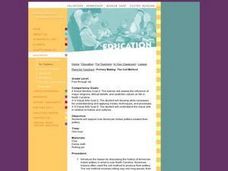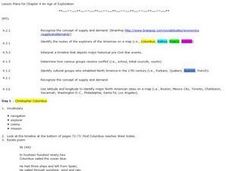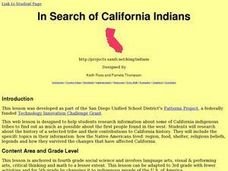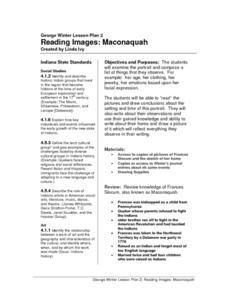Curated OER
Centennial: A Patchwork Quilt..People Of Utah
Fourth graders explain the contributions of Native American Indians and explorers. They identify the variety of ethnic backgrounds in their immediate community and in the state and complete a writing assignment on this topic.
Curated OER
Pottery Making: The Coil Method
Students discuss the history of Native American pottery in North Carolina. They explore the coil method of making pottery and make their own creations implementing the coil method. They can allow the pots to dry or have them kiln-fired.
Curated OER
Inference By Analogy
Students infer the use or meaning of items recovered from a North Carolina Native American site based on 17th-century European settlers' accounts and illustration.
Curated OER
Where Indians and Bison Meet
Fifth graders examine a transparency of the Pre-2004 Monticello Nickel and compare it to the American Bison Nickel. They research Native American tribes and discover why the bison was so important to them. They create products showing...
Curated OER
I Heard the Owl Call My Name
Eleventh graders write a two to three page paper addressing one of the following topics: Analyze the values and beliefs of the two conflicting cultures. Explain which values seem to dominate within the conflict and why. They brainstorm...
Curated OER
Debating for Land
Students research pertinent information based on historical facts and is supported by quotations from primary sources in order to prepare for a class debate about land ownership in the 19th century.
Curated OER
Navajo Weaving
Learners explore the Navajo culture. In this Navajo Indians lesson, students gain information about their weaving and dancing. Learners note the patterns in the weaving. Students create a dance that corresponds with the patterns they see...
Curated OER
The Dream Catcher
Students create a dream catcher. In this visual arts lesson, students read the book Dream Catcher and create a dream catcher by using a willow branch, leather string, feathers, and beads.
Curated OER
Cornplanter and the Fate of His Land
Young scholars explore Chief Cornplanter and his importance as the leader of the Seneca tribe. In this Chief Cornplanter lesson, students examine how the Seneca land was taken over by the right of eminent domain. Young scholars answer...
Curated OER
The Four Corners Region of the United States Cultures, Ruins and Landmarks
Learners who live in the inner city are introduced to the four corners region of the United States. In groups, they examine how the region differs compared to where they live and their culture. They develop maps of the area and locate...
Curated OER
Rock Art
First graders create and share their own rock art based on Navajo and Hawaiian rock art.
Curated OER
Art Curators
Students use the Internet to select various works of art around a theme. They create a PowerPoint exhibit of these works and create the written documentation to accompany their presentation. They critique the class exhibits.
Curated OER
Artistic Symbols
Students compare and contrast symbols used in African and Plains Indian art. In this visual arts instructional activity, students compare symbols of 2 cultural groups found in their art. Students write a description of what items might...
Curated OER
Thanksgiving and Agriculture
Young scholars listen to the book "The Pilgrim Story" and discuss the Pilgrims and why they came to America. Students role play the Thanksgiving story and write about how Pilgrims and Indians relate to them today.
Curated OER
Thirteen Moons Language Lesson
First graders study, discuss, and memorize the meanings in the Oneida Language of the most commonly used names for each of the Thirteen Moon cycles in their community. They draw pictures corresponding with the name of each of the moon...
Curated OER
Hindu Festival - Let's Celebrate Diwali
Students explore characteristics, roles and cultural expressions of Indian community in New Zealand. They describe traditional practices of Diwali Festival, collect and record information, design open-ended questionnaire, create Diwali...
Curated OER
Lakota Beaded Leather Bag
Students examine and review Lakota beadwork designs. They watch an instructional video on how to bead and then design and graph a design on paper. Finally they bead the design onto a leather bag.
Curated OER
Create your own Parfleche!
What is a parfleche? It is a box used by the Plains Indians to carry goods as they traveled. First, the class will discuss the uses of these highly ornate boxes and the nature of the Plains Indians' nomadic lifestyle. Then, the class...
Curated OER
An Age of Exploration
Students investigate U.S. history by examining North American timelines. In this American exploration instructional activity, students research the events that led to Columbus finding America and participate in a jeopardy game regarding...
Curated OER
In Search of California Indians
Fourth graders research information about some of California indigenous tribes to find out as much as possible about the first people found in the west. They research about the history of a selected tribe and their contributions to...
Curated OER
Topsy Turvy Kids
Sixth graders study the artwork of Jaune Quick-to-See Smith before creating their own. In this painting lesson, 6th graders examine two pieces of work by Jaune Quick-to-See from the online collection of the Missoula Art Museum and read a...
Curated OER
Raven Mask
Students explore the artistic expressions of the Northwest Native American Indians and using traditional palette of colors, create a personal interpretation of the traditional raven mask.
Curated OER
The History of Thanksgiving Day
Third graders study the history of Thanksgiving. In this holiday lesson plan, 3rd graders read about the history of Thanksgiving, complete vocabulary activities, and write a journal entry from the point of view of someone who lived...
Curated OER
Reading Images: Maconaquah
Students examine a portrait of Maconaquah and compose a list of things they observe about her. They look at her age, clothing, jewelry, and her emotions based on her facial expression. Conclusions are drawn as they "read" the pictures...

























